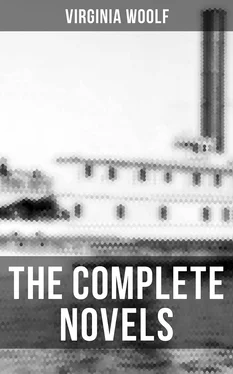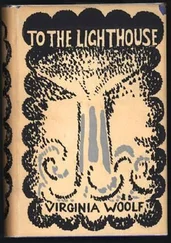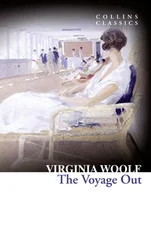When this had happened about five times, Hirst, who leant against a window-frame, like some singular gargoyle, perceived that Helen Ambrose and Rachel stood in the doorway. The crowd was such that they could not move, but he recognised them by a piece of Helen’s shoulder and a glimpse of Rachel’s head turning round. He made his way to them; they greeted him with relief.
“We are suffering the tortures of the damned,” said Helen.
“This is my idea of hell,” said Rachel.
Her eyes were bright and she looked bewildered.
Hewet and Miss Allan, who had been waltzing somewhat laboriously, paused and greeted the newcomers.
“This is nice,” said Hewet. “But where is Mr. Ambrose?”
“Pindar,” said Helen. “May a married woman who was forty in October dance? I can’t stand still.” She seemed to fade into Hewet, and they both dissolved in the crowd.
“We must follow suit,” said Hirst to Rachel, and he took her resolutely by the elbow. Rachel, without being expert, danced well, because of a good ear for rhythm, but Hirst had no taste for music, and a few dancing lessons at Cambridge had only put him into possession of the anatomy of a waltz, without imparting any of its spirit. A single turn proved to them that their methods were incompatible; instead of fitting into each other their bones seemed to jut out in angles making smooth turning an impossibility, and cutting, moreover, into the circular progress of the other dancers.
“Shall we stop?” said Hirst. Rachel gathered from his expression that he was annoyed.
They staggered to seats in the corner, from which they had a view of the room. It was still surging, in waves of blue and yellow, striped by the black evening-clothes of the gentlemen.
“An amazing spectacle,” Hirst remarked. “Do you dance much in London?” They were both breathing fast, and both a little excited, though each was determined not to show any excitement at all.
“Scarcely ever. Do you?”
“My people give a dance every Christmas.”
“This isn’t half a bad floor,” Rachel said. Hirst did not attempt to answer her platitude. He sat quite silent, staring at the dancers. After three minutes the silence became so intolerable to Rachel that she was goaded to advance another commonplace about the beauty of the night. Hirst interrupted her ruthlessly.
“Was that all nonsense what you said the other day about being a Christian and having no education?” he asked.
“It was practically true,” she replied. “But I also play the piano very well,” she said, “better, I expect than any one in this room. You are the most distinguished man in England, aren’t you?” she asked shyly.
“One of the three,” he corrected.
Helen whirling past here tossed a fan into Rachel’s lap.
“She is very beautiful,” Hirst remarked.
They were again silent. Rachel was wondering whether he thought her also nice-looking; St. John was considering the immense difficulty of talking to girls who had no experience of life. Rachel had obviously never thought or felt or seen anything, and she might be intelligent or she might be just like all the rest. But Hewet’s taunt rankled in his mind—“you don’t know how to get on with women,” and he was determined to profit by this opportunity. Her evening-clothes bestowed on her just that degree of unreality and distinction which made it romantic to speak to her, and stirred a desire to talk, which irritated him because he did not know how to begin. He glanced at her, and she seemed to him very remote and inexplicable, very young and chaste. He drew a sigh, and began.
“About books now. What have you read? Just Shakespeare and the Bible?”
“I haven’t read many classics,” Rachel stated. She was slightly annoyed by his jaunty and rather unnatural manner, while his masculine acquirements induced her to take a very modest view of her own power.
“D’you mean to tell me you’ve reached the age of twenty-four without reading Gibbon?” he demanded.
“Yes, I have,” she answered.
“Mon Dieu!” he exclaimed, throwing out his hands. “You must begin to-morrow. I shall send you my copy. What I want to know is—” he looked at her critically. “You see, the problem is, can one really talk to you? Have you got a mind, or are you like the rest of your sex? You seem to me absurdly young compared with men of your age.”
Rachel looked at him but said nothing.
“About Gibbon,” he continued. “D’you think you’ll be able to appreciate him? He’s the test, of course. It’s awfully difficult to tell about women,” he continued, “how much, I mean, is due to lack of training, and how much is native incapacity. I don’t see myself why you shouldn’t understand—only I suppose you’ve led an absurd life until now—you’ve just walked in a crocodile, I suppose, with your hair down your back.”
The music was again beginning. Hirst’s eye wandered about the room in search of Mrs. Ambrose. With the best will in the world he was conscious that they were not getting on well together.
“I’d like awfully to lend you books,” he said, buttoning his gloves, and rising from his seat. “We shall meet again. “I’m going to leave you now.”
He got up and left her.
Rachel looked round. She felt herself surrounded, like a child at a party, by the faces of strangers all hostile to her, with hooked noses and sneering, indifferent eyes. She was by a window, she pushed it open with a jerk. She stepped out into the garden. Her eyes swam with tears of rage.
“Damn that man!” she exclaimed, having acquired some of Helen’s words. “Damn his insolence!”
She stood in the middle of the pale square of light which the window she had opened threw upon the grass. The forms of great black trees rose massively in front of her. She stood still, looking at them, shivering slightly with anger and excitement. She heard the trampling and swinging of the dancers behind her, and the rhythmic sway of the waltz music.
“There are trees,” she said aloud. Would the trees make up for St. John Hirst? She would be a Persian princess far from civilisation, riding her horse upon the mountains alone, and making her women sing to her in the evening, far from all this, from the strife and men and women—a form came out of the shadow; a little red light burnt high up in its blackness.
“Miss Vinrace, is it?” said Hewet, peering at her. “You were dancing with Hirst?”
“He’s made me furious!” she cried vehemently. “No one’s any right to be insolent!”
“Insolent?” Hewet repeated, taking his cigar from his mouth in surprise. “Hirst—insolent?”
“It’s insolent to—” said Rachel, and stopped. She did not know exactly why she had been made so angry. With a great effort she pulled herself together.
“Oh, well,” she added, the vision of Helen and her mockery before her, “I dare say I’m a fool.” She made as though she were going back into the ballroom, but Hewet stopped her.
“Please explain to me,” he said. “I feel sure Hirst didn’t mean to hurt you.”
When Rachel tried to explain, she found it very difficult. She could not say that she found the vision of herself walking in a crocodile with her hair down her back peculiarly unjust and horrible, nor could she explain why Hirst’s assumption of the superiority of his nature and experience had seemed to her not only galling but terrible—as if a gate had clanged in her face. Pacing up and down the terrace beside Hewet she said bitterly:
“It’s no good; we should live separate; we cannot understand each other; we only bring out what’s worst.”
Hewet brushed aside her generalisation as to the natures of the two sexes, for such generalisations bored him and seemed to him generally untrue. But, knowing Hirst, he guessed fairly accurately what had happened, and, though secretly much amused, was determined that Rachel should not store the incident away in her mind to take its place in the view she had of life.
Читать дальше












